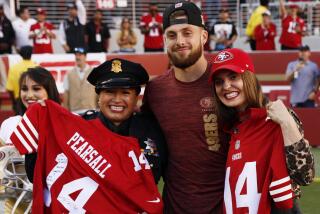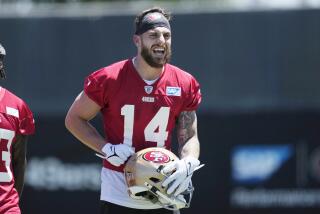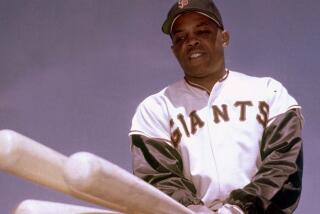R.C. Owens dies at 77; 49ers ‘alley oop’ receiver
R.C. Owens had an up-and-down career as a receiver for the San Francisco 49ers.
The ball went up, and Owens routinely came down with it.
Owens, whose leaping catches became his signature and introduced the term “alley oop” into the sports lexicon, died of kidney failure June 17 in Manteca, south of Stockton. He was 77.
“There were numerous games when he’d jump up and score the winning touchdown,” recalled Bob St. Clair, a tackle and captain on 49ers teams in the 1950s. “The defensive backs would fall down in the end zone and pound the turf. They’d just get so mad at themselves that he was able to out-jump them all. We’d just laugh.”
Although the long-pass play was labeled in the playbook as “West Four right,” it was simply known as “alley oop” to the 49ers and then their fans, who first witnessed it in a game in 1957.
Quarterback Y.A. Tittle would lob a pass into a crowd, and Owens, a onetime College of Idaho basketball star who led the nation in rebounding, would snatch it out of the sky.
“Do you know any teenagers? Even they could throw that pass,” Tittle told the San Jose Mercury News in 2007, the 50th anniversary of the club’s first documented alley oop. “You just throw it up in the air and hope.”
There is some debate over when the first such pass was thrown, but the 49ers point to their fourth exhibition game in 1957, when Tittle — in the face of a fierce pass rush by the Chicago Cardinals — attempted to safely fling a ball away by tossing it out of the back of the end zone.
To Tittle’s shock, the rookie Owens bounded up and reeled in the football for a touchdown.
“Gee whiz, you made me look good,” Tittle said.
“I can do it every time,” Owens replied.
Alley oop plays resulted in three game-winning touchdowns that season, powering the 49ers to an 8-4 record and their first playoff appearance. He once blocked a field goal by swatting away the ball just as it was about to clear the crossbar. (NFL rules now preclude that type of goal tending.)
The term “alley oop” is now used more frequently in basketball, typically referring to a set-up for a dunk in which a player lobs the ball to a teammate near the rim.
Raleigh Climon Owens was born Nov. 12, 1934, in Shreveport, La. His parents moved to Santa Monica two years later. He attended College of Idaho on a football and basketball scholarship, and while there talked his roommate, future Lakers great Elgin Baylor, out of playing football.
Even though he was selected in the 14th round of the 1956 NFL draft, Owens made an immediate splash. He was the 49ers’ rookie of the year, with 27 catches for 395 yards and five touchdowns — big numbers in an era of running the football.
Owens played eight seasons in the NFL, his first five with the 49ers (1957-61), followed by two with the Baltimore Colts (1962-63) and one with the New York Giants (1964). He was the first NFL receiver to wear gloves, a holdover from those bitter-cold games in Idaho.
Owens had an effect on the game that extended beyond the field. Unhappy with a contract that paid him $10,500 for the 1960 season, he played out his option year in 1961 instead of signing a new deal with the 49ers. He then became a free agent, and the first to play out his option year then sign with another team, the Colts.
So jarring was that move that 49ers owner Vic Morabito never again spoke to Colts owner Carroll Rosenbloom. A year later, NFL Commissioner Pete Rozelle devised the “Rozelle Rule,” which required the signing team (in Owens’ case, the Colts) to compensate the player’s original team for the loss — usually in the form of money or draft picks.
No stranger to heartache, Owens was involved in a tragic car accident in June 1963 as he was driving to Colts training camp in Colorado. A tornado swept his car off the road, and his 3-year-old daughter, Pam, was killed. His 1-month-old son, Darren, sustained a fractured skull, which the family believed led to his death at age 7.
After his playing career, Owens worked in public relations for J.C. Penney Co. and later in a California office for the Department of Health, Education and Welfare. He returned to sports to work in marketing for the Oakland Stompers soccer team.
In 1979, Bill Walsh hired him to organize 49ers training camp, and Owens was reunited with the franchise that gave him his start. During more than two decades in the team’s front office, he ran alumni relations for a franchise that would go on to win five Super Bowls, served as the point man for the club in the community and even donned a red suit and white beard to play Santa at Christmas.
Nicole Gisele, longtime administrative assistant to Hall of Fame coach Walsh, remembered Owens as an unfailingly upbeat ambassador for the franchise: “It was his motto: ‘I’m two steps away! I’ll be right there!’ ”
“You name it, R.C. did it for the players,” former 49ers cornerback Eric Wright said. “Guys looked up to him. He was a mentor to a lot of the younger guys and a big brother to all of us.”
Owens is survived by his wife, Susan; his daughter, Melinda Grissett; son, Kelvin Owens; stepsons Ken Morrell and Anthony Salazar; stepdaughter Shelly DiStefano; and 17 grandchildren.
A memorial service will be held at 11 a.m. Friday at Glide Memorial Church, 330 Ellis St., San Francisco.
More to Read
Start your day right
Sign up for Essential California for the L.A. Times biggest news, features and recommendations in your inbox six days a week.
You may occasionally receive promotional content from the Los Angeles Times.







